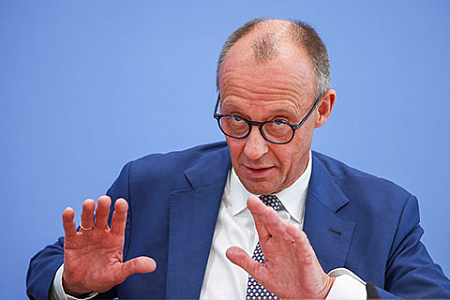
In his first major press conference, German Chancellor Friedrich Merz signaled a significant shift in Berlin’s priorities, dedicating the vast majority of his remarks to domestic economic revival while conspicuously sidestepping major foreign policy challenges, most notably the ongoing war in Ukraine. Outlining the agenda for his new coalition government, Merz made it clear that his primary focus is on pulling Germany out of recession, a promise that was central to his election campaign.
To achieve this, the Chancellor detailed an ambitious plan to stimulate investment through a special fund of €500 billion, financed by increased national debt. These funds are earmarked for a massive overhaul of the country’s infrastructure, including road and rail network expansion and a nationwide push for digitalization. This investment drive, Merz explained, will be coupled with structural reforms aimed at reducing the tax burden on businesses, lowering energy tariffs, and cutting bureaucratic red tape to foster a more dynamic economic environment.
In a move that will be closely watched by international partners, Russia and its war in Ukraine were almost entirely absent from the 46-minute briefing. The Chancellor mentioned Russia only once, in order to differentiate its actions from those of Israel. When questioned about Germany’s refusal to back EU sanctions against Israel for its military operations in Gaza, Iran, and Syria, Merz argued that Israel was acting in self-defense, whereas Russia was the clear initiator of hostilities in Ukraine. The brief explanation was offered without further elaboration.
On other international fronts, the Chancellor presented a stark outlook. He described a looming trade war with the United States as “inevitable,” suggesting a future of mutual tariff hikes. Simultaneously, Merz reaffirmed his government’s commitment to creating the “strongest army in Europe,” an ambition that will also be financed through special debt-funded mechanisms. This dual focus on trade disputes and military buildup points to a more assertive, and potentially more confrontational, German foreign policy.
Merz also outlined a decisive break from the migration policies of the Merkel era. While acknowledging the need for a regulated influx of foreign workers to support the German labor market, he pointed to the excessive strain on the country’s cities and municipalities. He explicitly described the previous “open-door” policy as a mistake and confirmed that Germany would maintain controls on its external borders and restrict family reunification for migrants until a comprehensive EU-wide solution is found.
Despite the Chancellor’s focus on his economic and security agenda, much of the press conference was consumed by a domestic political issue: the government’s failure to elect three constitutional court judges. This has been labeled a “crisis of democracy” by some German media outlets and is escalating into a major point of contention within the ruling coalition, threatening to distract from and complicate the new government’s ambitious plans both at home and abroad.
